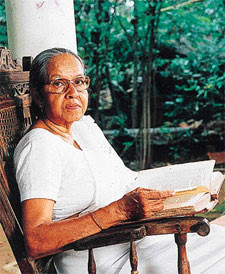Irangani Serasinghe Pioneer of Ruk
Rakaganno
by Ayoma Wijesundara
by Ayoma Wijesundara
When the name of Irangani Serasinghe is mentioned one
instantly associates her with the Art Circle of the Cinema and Theatre. She is
one of Sri Lanka’s most talented veteran actresses, her talent being discovered
by none other than Lester James Peries who watched her acting in the Colombo University’s
King Georges Hall many decades ago and offered her a small part in a film he
did for the Traffic Police called "Be Safe or Sorry." Seeing her
potential he thereafter gave her a major role in REKHAWA which was a
huge success. She has acted in more than 25 major films and many more
teledramas.
What most of her fans would not know
about her is her absolute dedication and love for the environment which has
been no secret yet not publicized as much as her film career.
Her days are filled with a busy schedule
with shooting of teledramas demanding most of her time, but she allocates time
for her environmental work. She identifies herself with the serenity and the
calmness that the trees around her affords. Her love for unspoilt nature she
nurtured in Balangoda and Ruwanwella in her ancestral homes lives on as
nostalgic memories. She has not abandoned them, yet working diligently in her
spare time planting indigenous trees such as Sandalwood, Bulu, Nelli, Kahata,
Kudu Dawula in her tiny estate in Belihuloya Pambahinna, not deterred by the
forest fires and the deadly Kachan winds that rage every year destroying most
of the endemic and indigenous trees and plants of the region.
In 1972 she embarked on her crusade
to safeguard our National Forests which were being destroyed by various acts of
vandalism by the government and the people. She formed a small society, named
it "Ruk Rakaganno" (Protectors of the Trees) with a handful of
dedicated members and worked zealously towards the salvation of our forest
land.
She was a Member of the Wild life
and Nature Protection Society, but she soon discovered that it was difficult
for her to reach the ear of the villager and win their confidence when she
identified herself with the wild life organization, as some of them had a
certain animosity towards wild life, due to the fact their cultivations being
destroyed by elephants and pigs. They would not spare time to listen to her
talk on promoting the planting of trees and sparing trees, when she introduced
herself as a team member of the Wild Life Organization, hence she embarked on
her own path, by forming her own "Tree Protection Society." She
spearheaded various programmes in villages and city schools educating school
children about the treasures of our national heritage, our endemic plants and
trees, their preservation and use, the medicinal values of our herbal plants
much ignored in the past but now awakened with the growing interest of
Ayurveda.
She encouraged so many to grow
plants and trees in their compound not only for their aesathetic value. Ruk
Rakaganno also supported other environmental organizations when it came to
the issue of Sinharaja Forest, where a part of it was earmarked to be felled
for a Plywood Project.
They actively lodged various
protests to Mr. J. R. Jayewardene when he was the Prime Minister against
potatoe cultivation in the Horton Plains, whereby the farmers were destroying
the most treasured species of river fish and polluting the rivers with
insecticide used for these projects. The springs were drying up, which caused
alarm to most environmentalists as Horton Plains was the source of many rivers
and water falls, not to mention the breathtaking Bakers Fall found and named
after Samuel Baker.
Currently, Irangani is busy helping
plant trees in the tsunami devastated areas of Galle, with the help of a
British NGO which is supporting the work of Ruk Rakaganno in their
endeavour to replace the plants, trees and shrubs that were washed away by the
tide. They are busy planting pandanus, (Wetakeiya) Barringtonia (Mudilla) a
lovely fruit and flowering plant that comes in two varieties, one by the sea
and the other that grows by rivers. The Anglican Church has allocated land to
help Ruk Rakaganno to maintain a nursery in Galle, whereby they could
grow their plants and sell them to tourists who would buy a plant and plant
them in places where they had been destroyed. Leading hotels of the area are
also very thankful for the Project and have been helpful. The Light House Hotel
is one such institution
Irangani says her burdens are
lighter now and her work load is not heavy, and she wishes to devote more of
her time to spread her message throughout our little island for the people to
understand and appreciate the lush greenness of our country, to protect it and
grow more trees than the ones being felled.
She has left a legacy to us all even
by getting her organization to print and publish books that would help the
novice to recognize these valuable endemic and indigenous trees. It is now a
challenge for all of us to promote this venture for a "Greener Sri
Lanka."
Courtesy: The Island
Art should never be about competition : Irangani
Serasinghe
It is quite ironic that people today
always talk about the teledramas and films of the past Too much nationalism is
bad. Nationalism tends to create divides between people and that is no way to
develop a country—we must portray unity and universal values I think women
should get involved in politics and public life and introduce a softer note to
politics and ensure, in the very least, the well being of their own kind
Veteran theater, cinema and
television actress Irangani Serasinghe is a Lankan legend, with her grace,
poise and warm smile she is the epitome of an ethereal “movie star”.


No comments:
Post a Comment